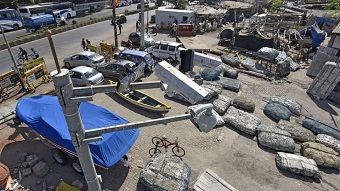Come 2021, the city that never sleeps could also be in the list of cities considered to be among the safest as the Mumbai Police plans to have eyes on every street possible. The Mumbai Police’s plan envisages to integrate a system of nearly 3 lakh closed circuit television (CCTV) cameras to its existing network. The city police force which currently has 5,300 CCTVs in its network is scheduled to add 7,000 more soon. In addition, Mumbai Police wants to integrate its existing CCTV network with private and commercial stakeholders across the city to ensure the streets of Mumbai are safe, said senior police officers.
As part of the plan, Mumbai Police started a project in November wherein they requested all major commercial establishments including shop owners, offices, hotels, community halls, religious places, and even residential societies to install CCTV cameras within a period of two months and warned to take legal action against those who refuse to abide by it. The deadline to install CCTVs ends on January 7, 2021.
“The plan is to have around 3 lakh digital eyes which would cover almost the entire city. We have planned this to ensure that the crime rate goes down drastically,” said joint commissioner of police (law and order), Mr. Vishwas Nangre Patil. Commenting on the compatibility of the cameras that establishments will install and the CCTV network of the police force, Mumbai Police spokesperson and deputy commissioner of police Mr. Chaitanya Siriprolu (operation) said, “Initially we thought of requesting establishments owners to install high-resolution cameras so that they would be compatible with the police’s monitoring system, but we dropped the plan as it could prove to be financially not viable for many.”
Patil said the presence of existing CCTVs has proved to be an effective deterrent to prevent crime, and that it was a step forward to prevent crime in the city. “While all the private CCTVs will not be directly integrated to the police surveillance and monitoring system, which uses comparatively advanced technology and cameras, these additional private cameras will compliment the network that is already in place. It will not only act as a deterrent to criminals psychologically, but it will also help police officers identify criminals and will aid in post-incident investigations including collection of evidence,” he added.
When asked about the punitive action against those who refuse to install a CCTV, Patil said, “If an establishment is located in a crime hot spot or accident-prone zone or is in a densely populated area, and the owner refuses to install a CCTV, we will first request him and make him understand the need for it. If the person still does not adhere to it, then action will be taken against them under section 188 (disobedience to order duly promulgated by public servant) of the Indian Penal Code. We did not want to forcefully impose this on everyone as we feel it will be unfair and hence have given them a period of two months which ends on January 7,” said Patil.
The officer further said that it is important for people to realise that these cameras are going to benefit them, and hence public participation is essential. The existing CCTV network has a command and control centre at the police headquarters, and the CCTV feed can be viewed from the Mumbai traffic police control room. The regional additional and deputy commissioners too can keep a watch on the CCTV feed. Local police stations also have access to the feed of cameras installed in their jurisdiction.





